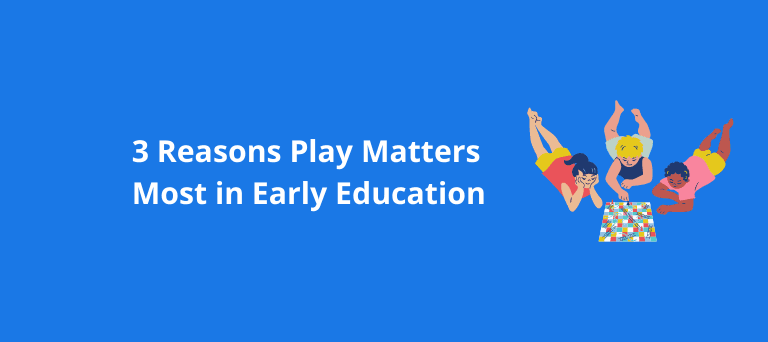Helen Evans, Early Years Teacher
6 Nov 2022
7
min read

Play is not a luxury or an afterthought. Play can contribute to children’s cognitive, physical and social development, as well as overall wellbeing.
Article 31 of the UN Convention on the Rights of the Child states that ‘every child has the right to rest and leisure, to engage in play and recreational activities appropriate to the age of the child and to participate freely in cultural life and the arts.’
Quality play experiences in early childhood have been shown to positively influence the way a child’s brain develops. Neural and chemical reactions in the brain, created by the act of playing, support cognitive development. With this in mind, here are some things to consider in your next Early Years role.
Cognitive and Physical Development
Wellbeing is paramount during early years, and there is considerable evidence that playing helps support children’s cognitive development, including the development of language skills, problem-solving and creativity.
Regular opportunities for children to play, especially in outdoor environments with natural features are hugely important! The sense of awe and wonder the children experience innately when playing aids the development of emotional connections towards the environment.
As stated in the UN convention on child rights, ‘natural elements are open-ended materials, that can respond to children's imagination and needs.’
In this process of reinvention and assigning new meaning to objects (e.g. a stick can be a sword, a boat or a pen), it is possible to mobilise skills related to divergent thinking, creativity, and problem-solving.
Enjoyment and Wellbeing
Playing gives children the opportunity to explore their feelings and express themselves. The development of a ‘sense of self’ through play can have a positive impact on children’s ability to cope with stress.
When children play, they are emotionally immersed in what they are doing, often expressing and working out the emotional aspects of their everyday lives. This helps them understand their own feelings and those of others.
Social Development
Children’s play is often a social experience, shared with others. Through play children create and establish friendships. Through play, children learn how to take turns, share toys, and cooperate with others. They also learn how to resolve conflicts, which is an essential life skill.
Play helps children build resilience by fast-tracking their development and understanding of relationships. The pleasure and satisfaction children experience whilst playing encourages them to extend their interests and creativity.
The Importance of Child-Led Play
‘A critical requirement for learning through play is that children must experience agency and be supported rather than directed. At one end of the spectrum, children are given more agency – the freedom to direct their own activities – and at the other, their play is guided by adults. Learning can happen at each point on the spectrum, but some degree of agency is a critical requirement for children’s engaged and effective learning. Giving children agency doesn’t mean giving them total freedom, but rather seeing children as active participants in their learning and not passive recipients. In other words, their play should be supported, not directed. The greatest opportunities for flexing their ‘thinking’ muscles come when children are allowed to create and develop through interactions with real-world examples.’
The Lego Foundation, 2019
As practitioners, we must be mindful to incorporate our knowledge of autonomous play into our settings. Over my 20-year teaching career, I developed my Early Years pedagogy to ensure I was providing the children in my care the best possible experience to maximise their individual development.
I am so passionate about giving children the best start right from birth that I created my new venture ‘My Baby Retreat’.
I have carefully curated boxes of toys based on a baby’s specific brain developmental stages throughout the first 12 months of life.
The boxes’ contents take a multi-sensory approach to play-based learning. The toys will support the bonding process between the baby and their carer and can be bought as gifts or on subscription and delivered every three months.
The boxes are exclusively available at mybabyretreat.com/
*“In 2013, I was excited to start my family and, as an Early Years Educator, I knew how important my baby’s brain development was right from birth – well in fact from conception, but we won’t get too technical! The vast choices of baby classes, toys, feeding equipment, and sensory items were totally overwhelming. I went a little crazy – there wasn’t a product I didn’t buy for my firstborn, Henry.
I would have loved someone to box me up a little bundle of the most beneficial toys and post it straight to me during those sleep-deprived days. Babies and young children develop so rapidly in their Early Years. Therefore, parents must have access to the highest quality, developmentally matched toys and resources during this period. This will support parents to get children off to the best possible start in life.”*
The boxes include:
0 - 3 month box - The Little Lemur
3 - 6 months box - The Marvellous Macaw
6 - 9 months box - The Terrific Toucan
9 - 12 months box - The Joyful Jaguar
Boxes are £14 per month for 12 months, or you can buy a one-off box for £50. I also have a range of high-quality and carefully chosen products in my online shop which is growing by the day.



